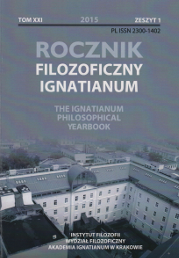Metafizyczne założenia koncepcji prawdy w "Logice" Marcina Śmigleckiego
Abstract
Centralnym elementem koncepcji prawdy u Smigleckiego jest jej sposób definiowania. Określając prawdę, zawsze wskazuje on na zgodność, a dokładnie wspólnotę formy (conformitas) czy to ujęcia intelektualnego z rzeczą, czy też rzeczy z jej intelektualnym odpowiednikiem, względnie z jej zasadami, wyznaczonymi ideą tkwiącą w intelekcie Bożym. Jest to jedna z postaci klasycznej definicji prawdy, zbliżonej do używanej przez św. Tomasza z Akwinu, umożliwiającej szerokie jej stosowanie: do dziedziny bytu (prawda transcendentalna), poznania i języka (prawda logiczna), a nawet moralnych przekonań (prawda moralna).
Smiglecki wyróżnia trzy typy prawdy: bytu, poznania i przekonań moralnych. Prawdę bytu utożsamia z prawdą transcendentalną. Prawdę poznania przypisuje nie tylko sądom i zdaniom, ale również pojęciom. Te ostatnie czerpią prawdziwość ze zgodności z rzeczami na sposób reprezentowania. Prawda sądów i zdań z rzeczami wynika ze zgodności realizującej się w postaci wypowiedzi. W odróżnieniu od pojęć, sądom przynależy prawda logiczna. Prawdę moralną, o której pisze, dziś nazwalibyśmy raczej prawdomównością.
Wszelką prawdę, z wyjątkiem moralnej, którą definiuje jako zgodność wypowiedzi z tym, co ktoś wewnętrznie sądzi, rozpatruje Smiglecki jako uwarunkowaną stanem przedmiotu poznania. Twierdzi, że:
a) ostatecznym przedmiotem odniesienia się ludzkich czynności poznawczych jest byt realny, bezwzględnie prawdziwy z racji zgodności ze swymi wewnętrznymi pryncypiami i swą ideą w intelekcie Bożym;
b) to zgodność z bytem realnym stanowi ostateczną podstawę prawdziwości ludzkiego poznania.
Tylko prawdzie poznania realnego bytu przyznaje charakter bezwzględny (absolutny). Poznanie przedmiotów czysto myślnych czy fikcyjnych jest co najwyżej prawdziwe względnie. Ta prawidłowość odznacza się niewątpliwie również w zdaniach o tym, co nie istnieje, oraz w zdaniach o wydarzeniach niekoniecznych z przyszłości.
Prawda ma szczególne znaczenie w nauce (scientia), choć swoim zakresem obejmuje szerszy obszar niż dziedzina poznania naukowego. Nie stanowi zatem doskonałości istoty nauki. Z drugiej strony poznanie naukowe jest z racji swojej istoty zawsze prawdziwe. Dlatego prawda stanowi pochodną własność jego istoty.
Literaturhinweise
Ajdukiewicz K (1965), "Logika pragmatyczna" Warszawa PWN.
Czerkawski J (1992), "Humanizm i scholastyka. Studia z dziejów kultury filozoficznej w Polsce w XVI i XVII wieku" Lublin Redakcja Wydawnictw KUL.
Dąmbska I (1973), "Kilka uwag o Marcinie Śmigleckim i jego logice", Studia i Materiały z Dziejów Nauki Polskiej. Vol. Seria E(5), pp. 3-9.
Darowski R (1994), "Filozofia w szkołach jezuickich w Polsce w XVI wieku" Kraków Wydawnictwo Ignatianum.
Doyle JP (2000), "Suarez on the Truth of the Proposition: This is My Body", The Modern Schoolman. (77), pp. 145-163.
Doyle JP (1988), "Suárez on Beings of Reason and Truth II", Vivarium. (26), pp. 51-72.
Doyle JP (1987), "Suárez on Beings of Reason and Truth II", Vivarium. (25), pp. 47-76.
Drzymała K (1981), "Ks. Marcin Śmiglecki TJ" Kraków Prowincja Polski Południowej Towarzystwa Jezusowego.
Drzymała K (1978), "Marcin Śmiglecki TJ (1563--1618)", Studia Historyczne. (21(1)), pp. 25-43.
Nowak L (1981), "Gnozeologiczne poglądy Marcina Śmigleckiego", In Z historii polskiej logiki. Wrocław , pp. 113-172. Zakład Narodowy im. Ossolińskich.
Nowak L (1977), "Interpretacja arystotelesowskiej teorii nauki u Marcina Śmigleckiego (1564--1628)", Studia i Materiały z Dziejów Nauki Polskiej. Vol. Seria E(6), pp. 35-87.
Nowak L (1977), "Marcina Śmigleckiego teoria nauki", Studia Philosophiae Christianae. (13(2)), pp. 109-143.
Nowak L (1973), "Marcina Śmigleckiego metody uzyskiwania wiedzy naukowej", Ruch Filozoficzny. (31(3)), pp. 227-230.
Nowak L (1968), "Logika Marcina Śmigleckiego w opinii współczesnych i późniejszych", Ruch Filozoficzny. (26(3)), pp. 219-222.
Olech A (2008), "W sprawie prawdomówności i prawdziwości. Kilka uwag logiczno-etycznych", Ruch Filozoficzny. (65(4)), pp. 671-675.
Olech A (2007), "O prawdomówności i prawdziwości", Principia. Pisma koncepcyjne z filozofii i socjologii teoretycznej. (49), pp. 5-20.
Roncaglia G (1995), "Smiglecius on „entia rationis”", Vivarium. (33), pp. 27-49.
Smiglecius M (1987), "Commentaria in Organum Aristotelis" Warszawa Akademia Teologii Katolickiej.
Smiglecius M (1618), "Logica... selectis disputationibus et quaestionibus illustrata, et in duos tomos distributa" Ingolstad ex typ. Ederiano apud Elisabetham Amgermariam.
Straszewski M (1930), "Historja filozofji w Polsce (przerobił i uzupełnił ks. F. Kwiatkowski)" Kraków Wydawnictwo Księży Jezuitów.
Suárez F (1861), "Opera Omnia" Parisiis Vol. 25 L. Vivès.
Taine H (1863), "Histoire de la littérature anglaise" Paris Vol. 3 Librairie de L. Hachette et Cie..
Voisé W (1994), "Marcin Śmiglecki: Logika (1618) Zamość, Oxford i perspektywy", Kwartalnik Historii Nauki i Techniki. (39(3-4)), pp. 117-124.
Wąsik W (1958), "Historia filozofii polskiej" Warszawa Vol. 1 Instytut Wydawniczy Pax.
Rocznik przyjmuje do druku wyłącznie materiały, które nie wchodzą w żaden konflikt interesów, żaden konflikt z prawem autorskim itp. Redakcja prowadzi działania przeciw: plagiatom, ghostwriting1, guest/honorary authorship2 itp. Autor pracy zbiorowej, który jest pierwszy na liście, bierze na siebie odpowiedzialność i ma obowiązek przedstawić wkład wszystkich współautorów. Jeśli publikacja powstała dzięki dedykowanym środkom finansowym, należy ujawnić to np. w Podziękowaniu, przypisie itp. Ew. przedruki wymagają jawnego zgłoszenia i okazania odpowiedniego pozwolenia wydawniczego. Autorzy / Recenzenci nierzetelni narażają się na reakcję właściwą stosownym instytucjom.
______
1 Ma to miejsce, gdy osoba mająca istotny wkład jest pominięta na liście Autorów czy w Podziękowaniu.
2 Zachodzi, gdy na liście autorskiej pojawia się osoba mająca znikomy/żaden udział w pracy.





